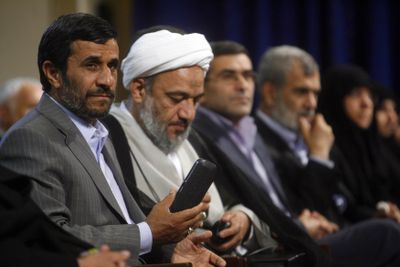Hard-liners try to stifle protests
Iran plans special courts to try demonstrators

Iran’s hard-line leaders moved aggressively Tuesday to silence protests over the disputed June 12 presidential election, rejecting demands for a new vote and announcing that President Mahmoud Ahmadinejad will be sworn in for a second term as early as July 26.
With massive security forces deployed in Tehran, the regime also promised that protesters would get harsh treatment from a special court.
It was far from clear, however, if the regime could succeed in extinguishing the opposition movement that erupted after the second-place finisher Mir Hossein Mousavi, accused the government of rigging Ahmadinejad’s landslide victory amid a record turnout and widespread economic dissatisfaction.
A Western diplomat who follows Iran said that with Mousavi’s whereabouts unknown, many of his top aides detained and communications restricted, the regime was anxious to exploit the opposition’s lack of coherent leadership.
He noted, however, that the struggle in the streets reflected deep divisions at the top of the regime that have dented Supreme Leader Ayatollah Ali Khamenei’s supposedly undisputed power.
“There is a crack in the dam,” said the Western diplomat, who requested anonymity in order to speak freely. “Whether it’s repairable or not is hard to tell.”
“Don’t expect that this will be resolved cleanly with a win or loss in short period of time,” Columbia University scholar Gary Sick wrote on his Web site. “This is not a sprint; it is a marathon.”
Patrick Clawson, the deputy director of the Washington Institute for Near East Policy, said that it appeared that Khamenei, who backs Ahmadinejad, and the political and security forces loyal to him had the upper hand for now. “This regime could be around 10 years, a lot longer than that,” he said.
Iran’s leaders Tuesday cranked up a campaign to blame Western powers and media for unrest that’s claimed at least 18 lives. They aired television interviews in which people purportedly arrested for rioting said U.S. and British government-funded radio broadcasts had instigated them and ordered two British diplomats to leave the country.
In an apparent attempt to mollify some protestors, however, Khamenei also agreed to extend until Monday the period in which election complaints could be filed, Iran’s English-language Press TV reported. In an apparent show of openness to reform, a senior member of the Majlis, or parliament, also said that the Islamic punishments of stoning and hand amputations would be eliminated by a revision of the penal code.
For a second day Tuesday, no major protests were reported in Tehran. However, Iranians posted messages on Twitter and other Web sites describing major deployments throughout the city of security forces. They included large numbers of Basij, the pro-government volunteer militia shown in numerous videos brutally attacking protesters with guns and clubs.
Large numbers of arrests have been reported since the protests began in the pre-dawn hours of June 13. Security agents detained at least 25 employees of Mousavi’s newspaper, Kalameh Sabz, Monday evening, the New York-based Committee to Protect Journalists said.
The Iranian government has gone to extraordinary lengths to block news on the crisis. It has restricted Internet and cell phone service, banned resident foreign correspondents from covering events on the streets, forcing them to rely on official news and statements, and ordered those on temporary visas out of the country.
The effort has largely strangled the flow of information from areas outside Tehran. It has failed, however, to prevent residents of the capital from sending a torrent of Internet messages, videos and pictures to the outside world.
Iranian bloggers described another night in Tehran of defiant anti-regime rooftop choruses of “God is great” and “Death to the Dictator.” While Mousavi’s whereabouts remained unknown, the reformist politician who also ran, Mahdi Karroubi, called for a nationwide day of mourning on Thursday for those killed by the security forces.